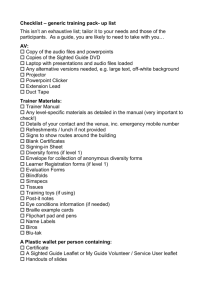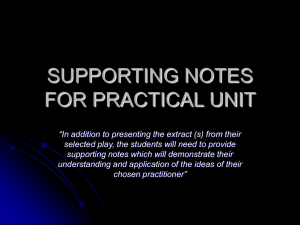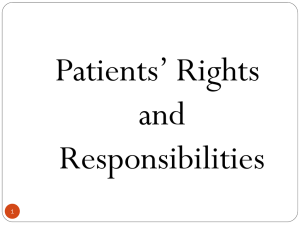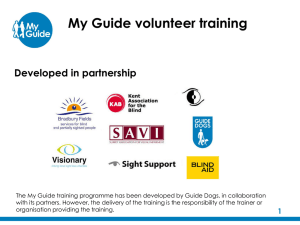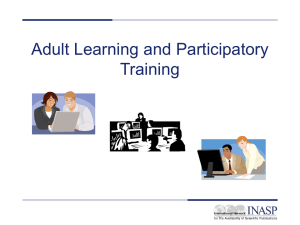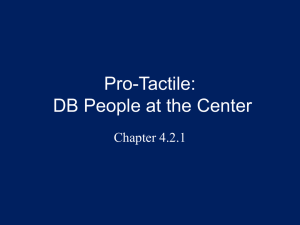Level 3 – My Guide Practitioner
advertisement
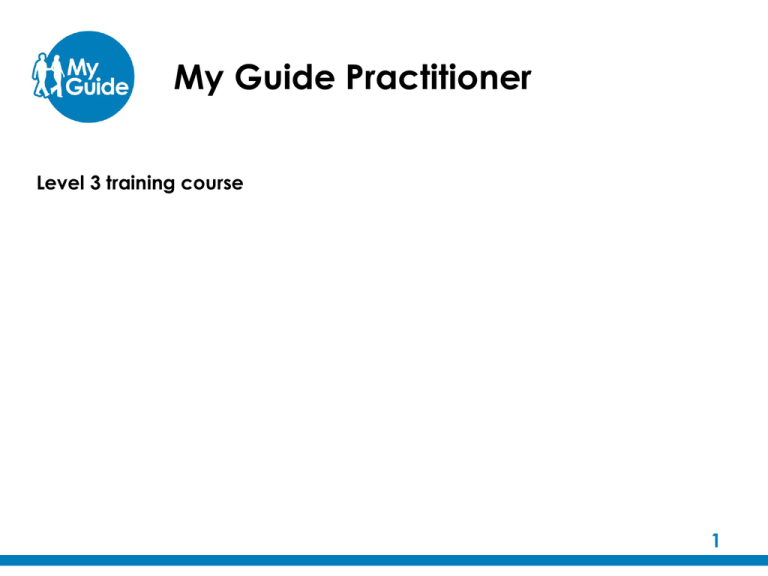
My Guide Practitioner Level 3 training course 1 My Guide training Developed in partnership The My Guide training programme has been developed by Guide Dogs, in collaboration with its partners. However, the delivery of the training is the responsibility of the trainer or organisation providing the training. 2 The aim of the course To enable participants to deliver and assess Level 1, Community Sighted Guide; Level 2, My Guide volunteer training and also Level 3 My Guide Practitioner to people in your own organisation. 3 Introductions Why are you interested in becoming a My Guide Practitioner? What are your hopes and fears for the course? What is the result of your learning styles questionnaire? 4 Guidelines to help the course run smoothly Mobile phones off or on silent please We all agree for only one person to speak at a time Relax! Say what you think Be respectful at all times 5 Course objectives 1 For participants to be able to: Confidently deliver Level 1, 2 and 3 courses by learning training techniques, management of the courses and a revision of the course materials 6 Course objectives 2 For participants to be able to: Observe and assess the learning of Community Sighted Guides (L1) and My Guide volunteers (L2) Apply background learning and in- depth understanding gained from their own study of Level 1 and 2 courses to support learners 7 Sighted Guide programme – an overview Level 1 – Community Sighted Guide Trained to act as eyes/vision with confidence In public as part of normal daily life Level 2 – My Guide volunteer Provides a sighted guide service for an agreed period to enhance the service user’s independence through getting out and about Level 3 – My Guide Practitioner Requires learning, assessment and practice at Levels 1,2 and 3 Trains other sighted guides 8 Sighted Guide programme – the training path Level 1 Community Sighted Guide training (+ observed practice) Level 2 My Guide volunteer training (including four online modules) plus two additional topics My Guide Practitioner training course (+observed delivery of training) 9 What makes a good trainer? Group to discuss good training experiences. What was it about these particular events that made them successful? 10 Learning Styles Share your result from the questionnaire Are you visual, auditory or kinaesthetic? Understanding of the different learning styles helps effective communication and learning 11 Visual learners Learn best by seeing things Will tend to use and respond to : I get the picture What’s your view? Training tools to use: diagrams, pictures 12 Auditory learners Learn best by hearing things Will tend to use and respond to : That rings a bell Sounds ok to me Training tools to use: stress key words, use stories and anecdotes to illustrate 13 Kinaesthetic learners Learn best by moving and doing things Will tend to use and respond to: How does that grab you? It certainly feels right Training tools to use: hands on activities, opportunities to move about 14 My Guide training Why might people want to take part in this training? What impact will these reasons have on the training and the trainer? 15 Principles of giving good feedback Allow time Avoid overload Always be constructive Use feedback to create a positive learning experience 16 Delivering the training – understanding the agendas and equipment Trainer’s role in administration Resources needed Resources available 17 Delivering the training Now it’s over to you…… 18 Assessment for Levels 1 and 2 Process for Level 1 and 2 Review the Level 1 assessment form -Assessing observed practice Review scores from online assessment on the My Guide learning site 19 Assessment of Practitioner Review of the Level 3 assessment form 20 Next steps to becoming a My Guide Practitioner Set dates to deliver Level 1 or Level 2 and arrange for assessor to be present Online learning is available on Guide Dogs learning site Best Practice Guide is available Support is available from your assessor: Name email and phone number 21 My Guide Practitioner Thank you for your participation Good luck 22
